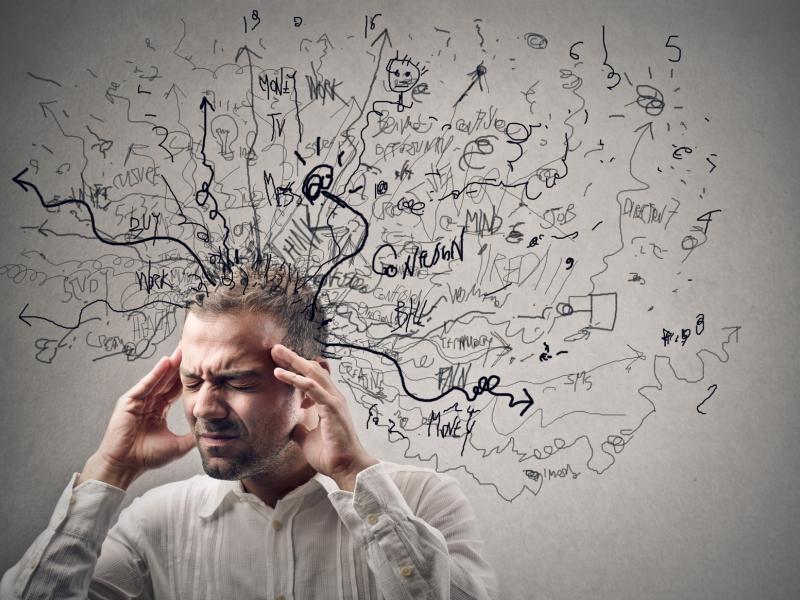Obsessive-compulsive disorder (OCD): What is it?
Obsessive-compulsive disorder (OCD) is a psychiatric disorder characterized by the presence of obsessive thoughts and compulsive behaviors that can interfere negatively with activities of daily living.
OCD is a disorder with a wide range of clinical manifestations. Although people with this diagnosis may present with seemingly different thoughts and behaviors, they share the basic mechanism: the interplay of obsessions and compulsions.
OCD: Where does it come from?
OCD has a complex, multifactorial etiology, and cannot be attributed to a single cause. Several scientific studies have delved into the genetic, neurobiological, and immunological aspects of this disorder.
It is well established that having parents or other family members with OCD increases the risk of developing the disorder. In addition, research suggests that the disorder may be more common in people who have experienced adverse events such as harassment, abuse, violence, trauma, or untreated grief.
Finally, elements such as
- An extremely harsh upbringing.
- An anxious personality.
- Meticulousness.
- A highly methodical approach or a strong sense of responsibility to self or others.
Ultimately, OCD develops through a complex set of factors, both genetic and environmental, that interact to determine its manifestation.
Types of OCD
Obsessive-compulsive disorder (OCD) is characterized by:
- Obsessions: are intrusive, recurring thoughts and mental images that cause profound uncertainty and anxiety.
- Compulsions (or rituals): These are behaviors, both physical and mental, that are performed to reduce the anxiety caused by the obsessions.
This creates a dangerous vicious cycle that can be difficult to escape.
Symptoms of OCD
The symptoms of OCD are very heterogeneous, but in practice, certain types can generally be distinguished. Some patients may suffer from more than one type of disorder at the same time or at different times in their lives.
The most common obsessive-compulsive disorders include:
- Mental contamination: obsessions and compulsions associated with unlikely (or unrealistic) infections or contaminants.
- Unnecessarily prolonged and repeated checks aimed at repairing or preventing serious misfortunes or accidents.
- Order/Symmetry and Precision: Sufferers absolutely cannot tolerate objects being placed in the least disorderly or asymmetrical way.
- Aggressive, sexual, or religious obsessions (taboo thoughts): Individuals suffering from this type manifest obsessive thoughts about the occurrence of highly unlikely situations that would be intolerable to them. The content of these obsessions can often be religious, social, or sexual. This is the case of those who are obsessed by the fear of being or becoming a homosexual or a pedophile, or those who are afraid of being seized by a sudden, uncontrollable aggression and harming those around them.
- Somatic problems
- Accumulation / Hoarding: This is a fairly rare type of obsession that characterizes those who tend to keep and accumulate (and sometimes even collect on the street) insignificant and unusable objects because they have enormous difficulty getting rid of them.
- Superstitious fears (magical thinking): The subject is dominated by rules according to which he or she must do or not do certain things, say or not say certain words, see or not see certain things, and so on.
However, the types of compulsion can be as follows
- Washing
- Tidying up
- Control and various requests for reassurance
- Repeating actions
Treatment of Obsessive-compulsive disorder
The main treatments for OCD are psychotherapy and pharmacotherapy.
- Psychological therapy: A cognitive-behavioral approach is generally indicated to reduce the amount and frequency of obsessive thoughts and compulsive behaviors.
- Medication: A type of antidepressant called a selective serotonin reuptake inhibitor (SSRI) is usually indicated because it works by regulating the balance of certain chemicals in the brain.
Doctors who specialize in psychiatry and neuropsychiatry are qualified to prescribe the most appropriate therapy or therapies for people with OCD.
The right therapeutic approach can make a real difference to the quality of life of OCD sufferers, enabling them to manage their symptoms and regain psychological well-being.






